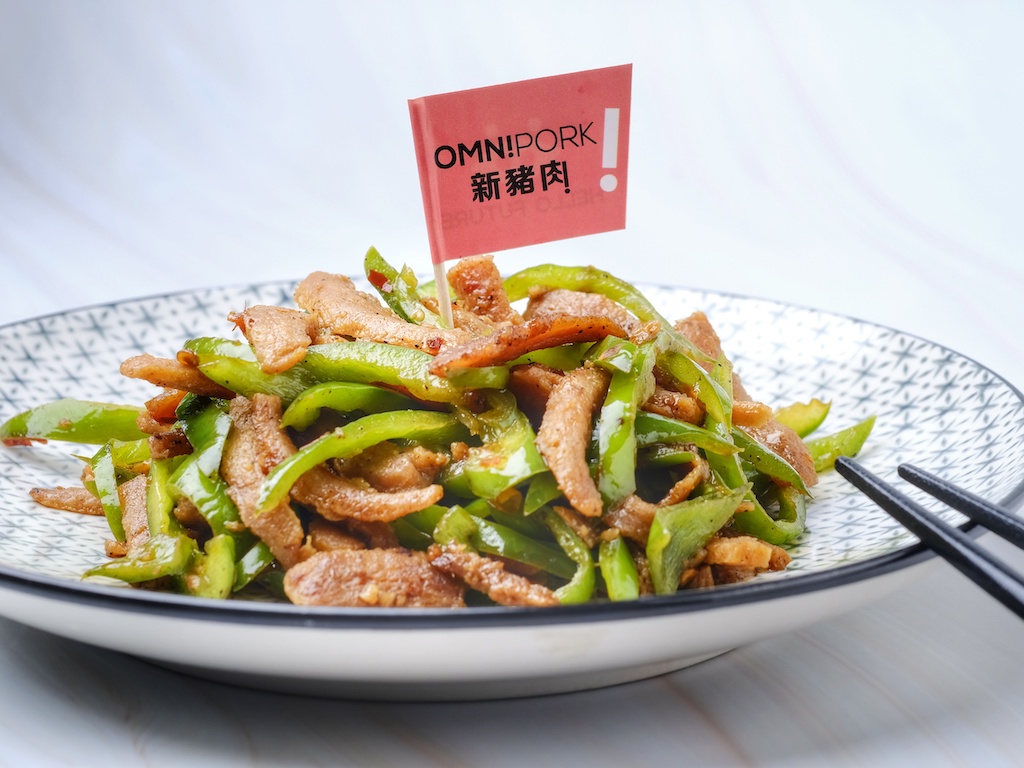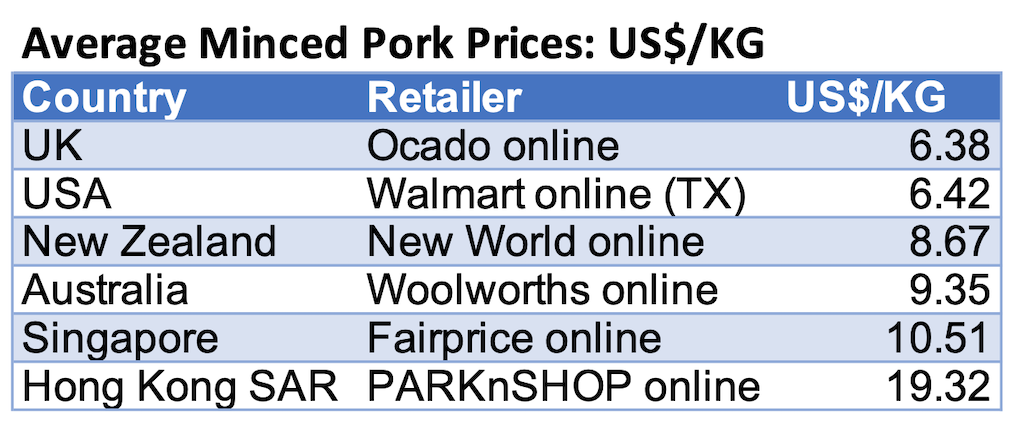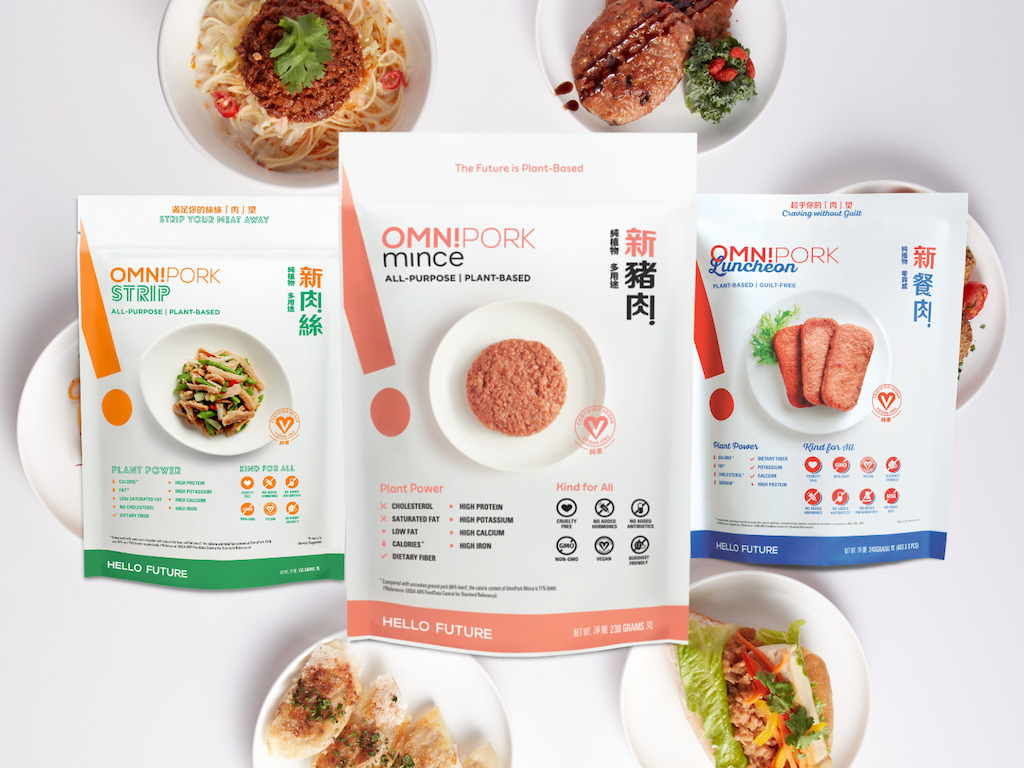4 Mins Read
Green Monday’s OmniFoods arm has announced double-digit price reductions for its OmniPork line of plant-based pork alternatives. It comes as the brand expands its international presence to 40,000 point-of-sales across 20 markets, achieving greater economies of scale and enabling its vegan analogues to compete at price parity with its real animal-based counterparts.
OmniFoods is reducing retail prices of its OmniPork range by double-digits, the Hong Kong-based food tech announced on Monday (May 17). Its flagship product OmniPork Mince will see prices slashed by 22%, while OmniPork Strip and OmniPork Luncheon will be lowered by 22% and 17% respectively.
The suggested retail prices in Hong Kong brings OmniFoods’ vegan analogues down to price parity with the cost of real animal-based pork, or in some cases, undercutting costs of its conventionally farmed counterparts sold within Hong Kong.
According to data provided by Green Monday, locally produced and imported frozen pork products from China, Thailand and Australia sold in both supermarkets and in fresh markets are priced between HK$28 to HK$60.3.
Comparatively, the OmniPork range is now being retailed between HK$38 to HK$48, while costs of traditional pork have continued to rise due to supply chain shortages as a result of African swine fever.

According to a Reuters report dated November last year, retail prices for pork in Hong Kong have shot up to HK$159 (US$20.31) per kilogram as a result of the disease outbreak among pig herds in China, the world’s largest pork producer, whom Hong Kong is especially reliant on for imports. On the e-commerce site of Hong Kong’s largest supermarket chain ParknShop, Thai chilled hormone-free pork is currently being sold for HK$150 per kilogram.
By reaching price parity – first in Hong Kong, and very soon regionally and globally – means such barrier[s] no longer exist.
David Yeung, Founder & CEO, Green Monday
These reduced prices will be extended to other markets that OmniFoods operates in the coming months, which has now reached 20 countries globally at more than 40,000 points-of-sale.
Green Monday’s OmniFoods recently entered the U.S. market, after launching in the U.K., Japan, Australia, and opened physical outlets of their grocery concept Green Common in both Shanghai and Singapore.
Hong Kong minced pork prices appear to be an outlier compared to global ones, where the average retail price is less than half that of major markets such as the U.K. and the U.S., as per the below table.

Commenting on the move to make vegan foods more accessible and affordable to mass consumers, Green Monday founder and CEO David Yeung said: “We firmly believe there should be no taste, nutrition and price sacrifice or barrier for anyone who aspires to switch to a healthier, more sustainable and more humane choice.”
“By reaching price parity – first in Hong Kong, and very soon regionally and globally – means such barrier[s] no longer exist. Customers and restaurants could not have found more reasonable grounds to favour plant-based products but not exclusive to OmniPork.”
OmniPork first landed in the market in 2018, and is made entirely from plant-based ingredients such as non-GMO soybeans, peas, rice and shiitake mushrooms.
OmniFoods says that in order to continue to scale its operations and meet rising consumer demand for plant-based alternatives, it will be ramping up manufacturing capacity in its current Thailand site, while additionally setting up a new production facility in Guangdong, China to supply the Chinese market.

We firmly believe there should be no taste, nutrition and price sacrifice or barrier for anyone.
David Yeung, Founder & CEO, Green Monday
The food tech further added that it is now “actively exploring another new production site in Taiwan.”
The move comes shortly after Silicon Valley food tech Impossible Foods announced several price cuts for its plant-based beef, including a 26.7% retail reduction in Hong Kong supermarkets in March, following separate reductions for wholesale and foodservice in January.
At the time, the company said that the reduction was made possible after having undergone the “largest operational expansion” in its 10-year history over 2020, driven by the coronavirus-related boost in demand for healthier and sustainable meat alternatives.
Impossible says that slashing costs until it ultimately “undercuts the price of ground beef from cows” is crucial to its mission to displace unsustainable animal agriculture entirely.
Lead image courtesy of Green Monday / designed by Green Queen Media.




